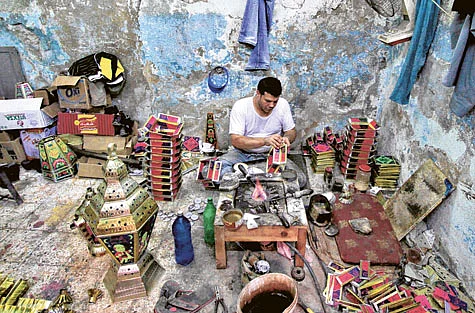Cairo: Tucked away in an alley in one of Cairo's oldest quarters, Nasser Mustafa painstakingly welds small metal pieces that will come together to form a traditional lantern.
Egyptians turn to the lantern, known as a fanoos, as part of the tradition of the month of Ramadan. It is hung on balconies and takes the centre of dinner tables when families gather to end their fast together.
Generational shift
The history of the fanoos in Egypt stretches back to the Fatimid Empire, which ruled large swaths of the Muslim world from Cairo starting in the 10th century. But, after nearly a century, the future of the Egyptian fanoos is under threat.
Less than a dozen fanoos makers remain in Cairo, as cheap Chinese imports and decades of government corruption have made plying their trade nearly impossible.
"Our great-grandfathers did this work, but our kids won't," said Rida Ashour, who stopped making the fanoos about ten years ago.
A stroll down one of Cairo's oldest streets shows this generational shift. Two decades ago, the street was known for its fanoos artisans, but today vendors complain that the metal and glass needed to make the lanterns is all imported and too expensive to buy. It's easier and cheaper to buy ready-made lanterns, especially ones made in China, the vendors said.
It can take anywhere from three days to several weeks of cutting, hammering, melting and welding to create a single fanoos. The smaller ones can cost 10 Egyptian pounds (Dh6), while larger custom-made ones can cost up to 10,000 Egyptian pounds (Dh6,151).
"Everything we use to make the fanoos from is imported, from A to Z," said Mohammad Fawzi, 27, who works in a small garage space with his two brothers and father making lanterns. He said they are producing about a third as many lanterns as they made before the Chinese lanterns flooded the market some 13 years ago.
Egypt imported $6 billion (Dh22 billion) of goods from China last year, while only exporting $1 billion (Dh3.67 billion) to that country, said Omaima Mabrouk, executive director for the Egyptian-Chinese Business Council.
To protect the local market, the government needs to create a system for workers' rights and improve management in both the private and public sectors, she said.
"You have a society that is losing, and what made the people lose is the government," Mabrouk said.
Many blame decades of widespread corruption under deposed President Hosni Mubarak for the inability of artisans to live off locally-made products.
"The local police would come and take our stuff and trash our stores if we didn't give them bribes," said Ashour, the former fanoos maker. "Police would come and kick our handmade work."
Sign up for the Daily Briefing
Get the latest news and updates straight to your inbox
Network Links
GN StoreDownload our app
© Al Nisr Publishing LLC 2026. All rights reserved.
